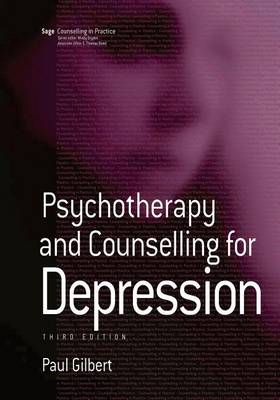Therapy in Practice
2 total works
Paul Gilbert examines the inherent features - a sense of failure, abandonment, powerlessness, shame and guilt - and highlights the fragility and negativity of the depressive state. Using illustrations and case examples, he traces the steps appropriate at different stages in the counselling process and shows how the counsellor can help clients to change and to cope independently, by managing the whole method of change for themselves.
'This book takes the reader gently but thoroughly through the biopsychosocial processes that underpin depression. Excellent worksheets and information sheets are provided as appendices. [It] is a valuable resource for those who already work with depression and essential reading for those considering working in this field' - Therapy Today
`Paul Gilbert provides the reader with a refreshingly wide-ranging, integrative and up-to-date understanding of the nature, assessment and treatment of depression. All psychological therapists will benefit from reading his important book' - Healthcare Counselling and Psychotherapy Journal
`Paul Gilbert writes in a scholarly, yet accessible, style on the bio-psychosocial perspectives of depression. I agree with him that knowledge of such areas is crucial to being able to work effectively with people experiencing depression' - Nursing Standard, 5 star review
`Psychotherapy and Counselling for Depression, Third Edition by the distinguished psychologist, Paul Gilbert, is an outstanding contribution to the field. I read this book with great enthusiasm and interest - and, I must acknowledge - admiration. All clinicians will benefit from reading this valuable book' - Robert L. Leahy, President, International Association for Cognitive Psychotherapy
Paul Gilbert's Psychotherapy and Counselling for Depression, Third Edition is a popular and practical guide to working with people suffering from depression. The book is based on a wealth of research into evolutionary, cognitive, behavioural and emotion-focused approaches to depression. It outlines how to work with general negativity, sense of failure and abandonment, and feelings of powerlessness, anger, shame and guilt
The book examines the essential stages of the therapeutic process from conceptualization and formulation through to a wide variety of interventions for different types of difficulty. It has been greatly revised, expanded and updated for the Third Edition and:
o explores in depth the biopsychosocial processes underpinning depression
o shows how a compassionate mind approach can be incorporated into different types of therapy
o includes a new chapter focusing on the role of the therapeutic relationship, including therapeutic dialogues
o features detailed guidance with case examples on how to work with a wide variety of depressions.
Psychotherapy and Counselling for Depression, Third Edition is an essential resource and comprehensive guide for practitioners and anyone involved with treating depression.
Paul Gilbert is Professor of Psychology in the Mental Health Research Unit at Kingsway Hospital, Derby.

